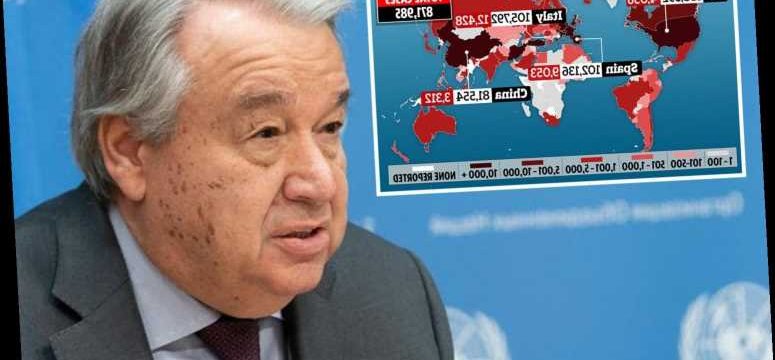THE coronavirus pandemic is the biggest crisis since World War Two and will cause ‘unparallelled’ economic disaster, a U.N. chief warns.
U.N. Secretary-General Antonio Guterres said Tuesday that the current pandemic threatens the livelihood of citizens in every country across the globe and will bring a recession that has no parallel in the recent past.
There is also a risk that the combination of the disease and its economic impact will contribute to enhanced instability, enhanced unrest, and enhanced conflict, the U.N. chief said.
At the Tuesday launch of a report on the socioeconomic impacts of COVID-19, Guterres called for a stronger and more effective global response to the coronavirus pandemic and to the social and economic devastation the virus is causing.
Worldwide, cases have now surpassed 870,000 with more than 43,000 deaths.
White House doctors warned yesterday up to 240,000 Americans could die from coronavirus.
'HUMANKIND AT STAKE'
Guterres asked world leaders to forget political games and reminded them that it is humankind that is at stake.
The report highlighted the global nature of the health crisis, saying it is unlike any in the 75-year history of the United Nations and was spreading human suffering and upending peoples lives.
"But this is much more than a health crisis. It is a human crisis. The coronavirus disease (COVID-19) is attacking societies at their core," the report said.
Guterres told reporters: "The magnitude of the response must match the scale of the crisis large-scale, coordinated and comprehensive, with country and international responses being guided by the World Health Organization."
But this is much more than a health crisis. It is a human crisis. The coronavirus disease (COVID-19) is attacking societies at their core.
The secretary-general stressed that we are still very far from where we need to be to effectively fight the COVID-19 worldwide and to be able to tackle the negative impacts on the global economy and global societies.
He said many countries are still not respecting WHO guidelines.
"Let us remember that we are only as strong as the weakest health system in our interconnected world," he said.
"It is essential that developed countries immediately assist those less developed to bolster their health systems and their response capacity to stop transmission."
While $5 trillion has been mobilized to fight the pandemic, most of that money has been issued by the developed world including $2 trillion in the United States to support their own economies from the consequences of the pandemic.
"We are far from having a global package to help the developing world to create the conditions both to suppress the disease and to address the dramatic consequences in their populations, in the people that lost their jobs, the small companies that are operating and risk to disappear, those that live with the informal economy that now have no chance to survive," he said. Massive support to the developing world is still required.
UP T0 25MILLION JOBS LOST
The crisis has sent world markets into freefall as experts warn millions will be unemployed and companies will go bust.
The report cites International Labor Organization estimates for 2020 that between 5 million and 25 million jobs will be lost, with a corresponding loss of between $860 million and $3.4 trillion in labor income.
It also cites an estimate by the U.N. trade and development organization UNCTAD of a 30-40 percent downward pressure on global foreign direct investment flows this year.
Last week, Angel Gurría, head of international trade body OECD, said the economic shock was already bigger than the financial crisis of 2008.
U.S. Treasury Secretary Steve Mnuchin warned unemployment could hit 20 per cent for the first time since the Great Depression of the 1930s.
And with growing fears being raised about the ability of the poorest countries to cope, Guterres announced the establishment of a COVID-19 Response and Recovery Fund to support efforts in low and middle-income countries.
The aim will be of swiftly enabling governments to tackle the crisis and promote recovery.
He expressed hope that there will be a positive response from the international community to help vulnerable people including the tens of millions of refugees and internally displaced people, those in the slums of big cities in the global south, and poor people in middle-income countries who are more numerous than in the least developed countries.
The secretary-general said developed countries must massively increase the resources available to the developing world by expanding the capacity of the IMF to issue special drawing rights, and enabling other international financial institutions to rapidly inject resources into countries that need them.
Guterres said he strongly supports an idea from French President Emmanuel Macron, Russian President Vladimir Putin and German Chancellor Angela Merkel at last weeks summit of the Group of 20 major industrialized nations that there should be a G20 initiative to help Africa.
"But, again, we must act quickly to make it happen," he said. "If not, the African continent will have enormous difficulties in facing this challenge."
Fears have previously been raised about the ability of the poorest countries to cope.
Last week, Mr Guterres launched a £1.5 billion coordinated global response plan to fight the virus in some of the world’s poorest countries.
“COVID-19 is menacing the whole of humanity – and so the whole of humanity must fight back,” he said.
“Individual country responses are not going to be enough. We must come to the aid of the ultra-vulnerable – millions upon millions of people who are least able to protect themselves.
“This is a matter of basic human solidarity. It is also crucial for combating the virus. This is the moment to step up for the vulnerable.”
Source: Read Full Article














